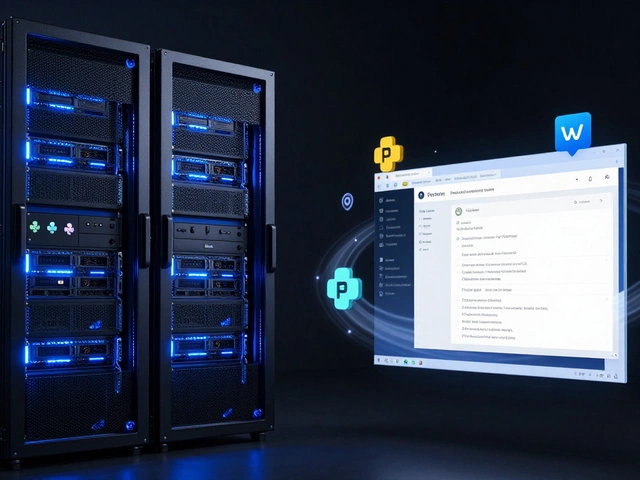Website hosting often feels like it's tethered to the very core of having an online presence. But does it absolutely have to be this way? The journey of understanding whether you can run your website without conventional hosting might just unfold surprising possibilities.
Traditionally, hosting services manage everything from servers to security patches, which makes running a website relatively seamless for owners. However, some tech enthusiasts and curious minds ponder the intriguing question of functioning without a typical hosting service. It's akin to wanting to build a dream house without hiring a construction company.
The idea of bypassing mainstream hosting solutions involves factors like self-hosting or leveraging unique platforms that challenge the norms. As we delve deeper, it's crucial to weigh the convenience of conventional hosting against the control and creativity of alternatives. Through this exploration, deciding how your site will live in the virtual world becomes a personal and empowered journey.
- Understanding Web Hosting
- The Self-Hosting Alternative
- Challenges and Considerations
- Weighing Your Options
The Self-Hosting Alternative
Venturing into the realm of self-hosting is like stepping onto a path less traveled, where you have the helm of your own website's journey. Self-hosting means setting up your own server at home or at an office, and it's a choice more daring folks make to gain ultimate control. The appeal of being the captain of your ship is undoubtedly thrilling, but this approach brings unique challenges.
To begin with, self-hosting lets website owners dip their toes into the intricate workings of web servers and internet infrastructure. You need a dedicated server computer, ideally one that runs around the clock, sturdy enough to handle traffic. Moreover, your internet connection plays a critical role; a high upload speed is crucial as it influences how quickly users can access your site across the web. Without robust internet service, the experience can falter for visitors, turning your creative endeavor into a frustrating one.
Security, a never-ending concern in the digital age, emerges as another significant hurdle. Typically, when using traditional website hosting services, security updates and malware scanning are handled by professionals. In a self-hosting setup, however, you are solely responsible for safeguarding your server, possibly from malicious access or digital threats. Implementing firewalls, regular software updates, and configuring secure sockets layer (SSL) certificates are tasks now resting on your shoulders.
As reported by TechRadar, "Operating your server implies greater control over your site's accessibility, but it also demands non-stop vigilance and technical expertise."
Then there's the technical expertise required to maintain and manage a self-hosted site. While this option offers flexibility and educational value, it can be daunting without prior knowledge. Technical challenges might include configuring DNS settings, setting up server software like Apache or Nginx, and managing databases such as MySQL. It's essential to assess your current technical skills or willingness to learn them before embarking on this path.
On a brighter note, self-hosting grants a liberating sense of independence. As an administrator, you have the freedom to customize server specifications, install desired software, and explore unique functionalities that standard web hosts may not provide. This flexibility can fuel innovation, letting you tailor your site to reflect your exact vision without limitations posed by hosting service policies or plans.
For many who choose the self-hosting path, heeding these considerations and preparing for a learning curve is key. There is, indeed, an exhilarating freedom in sculpting your digital space exactly as you wish. But, it's crucial to weigh the cost of time, resources, and expertise against the conveniences provided by conventional hosting. In embracing self-hosting, you're not only building a website; you're crafting an opportunity to broaden your technical horizons and elevate your understanding of the internet's backbone.

Challenges and Considerations
Diving into the realm of running a website without traditional hosting brings its fair share of hurdles. It's like stepping into uncharted territory, filled with both exciting discoveries and potential setbacks. One of the first things to consider is the technical know-how required. Without a hosting service to lean on, you are taking on the full responsibility of managing and maintaining your own server. This means handling everything from software updates to server configurations, all of which require a certain level of expertise. For the amateur or even intermediate tech enthusiast, this learning curve can be incredibly steep and time-consuming.
Another critical aspect is the internet speed and bandwidth of your DIY server. Hosting providers typically have the infrastructure to offer high-speed and stable connections. Your personal setup likely won't match that unless you invest heavily in dedicated lines and cutting-edge equipment. This could result in slower loading times, especially when your site experiences a spike in traffic. As
The Guardian once noted, "The speed of accessibility can define the success of a web-based venture."If your site is sluggish, that might frustrate users, impacting both accessibility and audience retention. So, while self-hosting might sound appealing, it comes with a real risk of delivering less reliability.
Security poses another significant challenge. Profesional hosting services often provide robust security features like DDoS protection, firewalls, and regular backups. Running your own server requires you to implement these security protocols yourself. One has to keep abreast of the latest cybersecurity strategies, constantly updating and adapting your defenses. Considering the increasing sophistication of cyber threats today, this is no small feat and requires continuous vigilance. A small misstep in security oversight could mean serious data breaches or loss of valuable user information, which could damage your reputation irreparably.
Then there’s the consideration of legal and compliance issues. When you host your own web servers, it's important to ensure compliance with various internet laws across different regions. For instance, data privacy regulations like the GDPR in Europe must be adhered to if you have users from those areas. Understanding and implementing these legal requirements is often more straightforward with professional hosting services that have in-house legal teams to manage compliance issues. Self-hosting demands thorough research and maybe even legal consultation to ensure you’re not inadvertently violating any laws.
The sheer volume of potential technical drawbacks, combined with financial and regulatory challenges, emphasizes the crucial need for careful planning and foresight. Balancing control and creativity, with these hurdles of independent website management, will determine if this approach aligns with your goals more than relying on mainstream hosting.”

Weighing Your Options
When it comes to deciding how to run your website, your options can seem both exciting and overwhelming. The traditional route of using a hosting service is easy, providing digital 'rental' space where your site files live. But it's not the only path. If you're toying with the idea of self-hosting, you're considering a path that gives you more control over every aspect, from the hardware to the software. Here, your site resides on a server you own or manage directly, which can be as simple as a personal computer you've modified to act like a server. There are unique challenges with this choice, largely due to technical demands. You need to ensure your server is always running, which means keeping it updated, secure, and functional around the clock.
Another modern twist is leveraging peer-to-peer networks, where website data is shared across multiple devices. This concept is backed by movement towards decentralization. Imagine every computer that visits your site acts like a small host, redistributing content when other users request it. The peer-to-peer model can enhance website load speed significantly due to distributed resources. However, this solution often faces skepticism about data integrity and security. It's crucial to understand that while your site might load faster, it could also be at more risk of unauthorized access if solutions aren't thoroughly vetted. The trade-off between speed and safety is a crucial consideration.
"The internet was supposed to be peer-to-peer; we have code and algorithms now that can truly make it so."—Tim Berners-Lee
If hosting services can be likened to living in a managed apartment, then self-hosting is more like building your house. You pick the design, the materials, and maintain it. This analogy helps to illustrate the total control you gain but also the responsibility. Looking into services like Amazon Web Services or Google Cloud can introduce you to hybrid options as well. They allow for scalable resources which means as your audience grows, you won't outgrow your hosting capabilities. Here’s where a consideration of costs comes in. Managed solutions provide lots of value but cost more whereas managing your servers potentially saves bucks but demands you become your own tech support.
Finally, think about what you envision for your site's future. If your site is a personal blog or a small project with limited expected traffic, self-hosting could be a charming hobby where you learn and build over time. But for business or large traffic sites, looking at professional solutions could save time and ensure uptime reliability. The key is understanding what you want to focus on. Is it growing the website's visitors, or is it expanding your tech skills by developing the infrastructure yourself?





